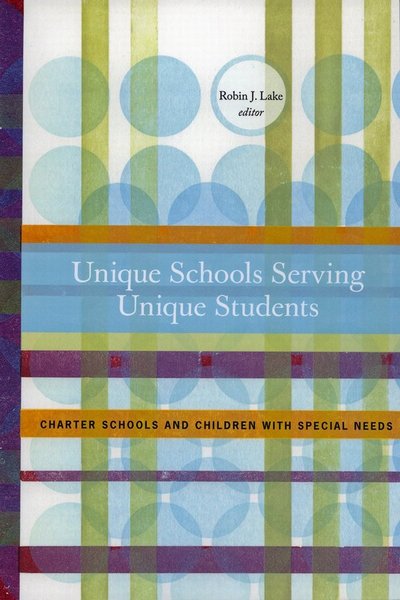May 20, 2010
New book studies how charter schools can better meet special education needs
A new book from the Center for Reinventing Public Education takes an in-depth look at the connection between charter schools and special education, and recommends ways such schools can improve their ability to serve special students’ needs.
Unique Schools Serving Unique Students was published by the center and edited by Robin Lake, its associate director. Its analysis found that school choice is important to parents of children with special needs, that many charter schools successfully include students with less severe needs, and that some charter schools are showing the way with practices that may benefit instructional programs in all schools
“It’s clear from our research that parents of children with special needs don’t care about labels or ideology when it comes to selecting a school that helps their child,” says Lake.
“These families want a school that works,” she says. “Whether it’s a public charter school, or one operated by the district, whether it’s exclusive to children with special needs or open to a general student body, if the school they are in doesn’t work for their child, they find one that does.”
Through in-depth analysis of six charter schools around the country, this book documents how special education students can be taught successfully using very different approaches.
Examples include:
- Woodland Elementary Charter School in Fulton County, Ga., which uses Talented-and-Gifted instructional strategies for all students;
- Metro Deaf School in St. Paul, Minn., which serves deaf and hard of hearing students with a dual-language American Sign Language/written English program; and
- Arnold Schwarzenegger Charter Elementary and Middle Schools in Los Angeles, which educate students with a wide range of disabilities in a remarkably inclusive setting.
Several important lessons for educators and policy leaders emerged from parent surveys and the six case studies:
- School choice is important to parents of children with special needs.
- Effective inclusion for students with less severe needs is a particular strength of many charter schools.
- Charter schools are revealing practices that may contribute to strong instructional programs for students with disabilities in all schools.
These examples illustrate Lake’s observation that “Some charter schools have developed informal reputations for being havens for special-needs students.”
Unique Schools also discusses the many challenges confronting both the institutions and parents. Federal and state laws require strict adherence to timelines and procedures for each student, such as the development and execution of an Individualized Education Program. While enacted to serve special education students, the mix of these laws can vary from state to state and in how they are interpreted and enforced. This erects frustrating and in some cases confusing environments for charter school leaders.
Cumbersome state-support structures for the learning-disabled that predate the advent of charter schools, the maze of legal and regulatory hurdles, inadequate funding and, importantly, insufficient human resources that limit a school’s capacity add to the complex list of issues at play for charter schools trying to serve this population.
The volume identifies policy, research, and investment opportunities at what Lake says is “this delicate intersection of special education and charter schools”:
- Policies to clarify charter school legal status and equalize charter school special education funding.
- Further oversight and incentives for charter schools to develop high-quality special education.
- More research on the academic growth of children with disabilities and new approaches to special education.
- Local, state and federal investments, including seeding special education financial risk pools, cultivating special education co-ops, and incubating technical assistance networks for charter schools.
Contributors to the book are Lauren Morando Rhim, LMR Consulting; Tracey O’Brien, Kelly Hupfeld, and Paul Teske of the University of Colorado Denver; Dana Brinson of Public Impact; and journalist Joanne Jacobs.



